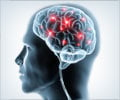In mice, a naturally occurring protein that blocks an inflammatory immune response was linked to better stroke recovery.

“By studying people who had an ischemic stroke and mice subjected to ischemic stroke, we discovered that during stroke, the immune system goes rogue in the brain,” said lead study author Frederik R. Denorme, Ph.D., a postdoctoral researcher at the University of Utah in Salt Lake City. “Previous research showed this most common type of stroke, caused by a blocked blood vessel in the brain, is associated with inflammation that can further damage brain tissue. In the past, however, treatments aimed at reducing this inflammation were unsuccessful.”
In this study, Denorme and his team looked at a particular immune cell, called a neutrophil, in humans and in mice. The usual role of the neutrophil is to prevent infection caused by viruses and other germs, in part by forming a web-like structure, or NET, for neutrophil extracellular trap, to capture germs. The researchers found that during a stroke, however, NETs can occur in the absence of infection, and instead of being protective can cause blood clots and brain damage.
Compared to a control group of healthy people without stroke, people with stroke were more likely to have NETs, as evidenced by the presence of certain proteins in the blood. These biomarkers were the highest among people with stroke who died or survived with disability. Study participants included 27 people with stroke and 27 healthy blood donors at the University of Utah. The adults were an average of 60 years of age, the majority were white and 40% were female.
To study the effects on stroke, the investigators blocked the formation of NETs in mice. To block NET formation, they administered a naturally occurring protein called nNIF, for neonatal NET-inhibitory factor, found in human umbilical cord blood.
The mice that were pretreated with nNIF had reduced brain injury, improved neurological and motor function and enhanced survival after stroke. Additionally, nNIF still improved stroke outcomes when administered after stroke onset and blocked NET formation after stroke without affecting other critical neutrophil functions.
Advertisement
A study limitation is the small number of human stroke patients. Future studies including more people are needed to verify the study’s findings and to pinpoint the optimal timing of the nNIF treatment, after additional studies in animal models establish its effectiveness.
Advertisement
Co-authors are Irina Portier, Ph.D.; Mark J. Cody, B.A.; Claudia V. De Araujo, Ph.D.; John L. Rustad, B.A.; Chieko Hoki, B.Sc.; Matthew D. Alexander, M.D.; Ramesh Grandhi, M.D.; Matthew D. Neal, M.D.; Jennifer J. Majersik, M.D., FAHA; Christian C. Yost, M.D.; Matthew A. Rondina, M.D., M.S., FAHA; and Robert A. Campbell, Ph.D. Author disclosures are in the abstract.
The study was funded by the National Institutes of Health and the American Heart Association.
Source-Eurekalert















